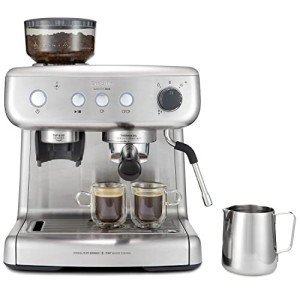Home Use Espresso Machines: A Comprehensive Guide
Espresso machines have actually ended up being a staple in many households as coffee lovers seek to replicate café-quality brews in the comfort of their kitchens. The rise in popularity has caused a varied market filled with numerous models, features, and prices. This short article aims to provide an informative overview of home use espresso machines, assisting readers browse their choices effectively.
Understanding Espresso Machines
Espresso machines work by requiring warm water through finely-ground coffee under high pressure, resulting in a focused coffee drink referred to as espresso. There are a number of kinds of espresso machines classified based on their developing approaches and level of automation. The most common types include:
- Manual Espresso Machines: These need the user to manage the pressure and water flow, permitting a more hands-on coffee-making experience.
- Semi-Automatic Espresso Machines: These provide automatic control over water pressure, while the user manually grinds and tamps the coffee.
- Automatic Espresso Machines: With the push of a button, these machines automatically control the flow of water, making it simpler to brew espresso with constant outcomes.
- Super-Automatic Espresso Machines: These all-in-one machines deal with grinding, tampering, developing, and even milk frothing, making them perfect for users looking for convenience.
- Pill or Pod Machines: These use pre-packaged coffee pods to develop espresso with minimal effort, but they restrict option in brewing strategies and flavors.
Table: Comparison of Espresso Machine Types
| Type | Control Level | Ease of Use | Cleaning up Level | Ideal For |
|---|---|---|---|---|
| Manual | User-controlled | Moderate | High | Coffee perfectionists |
| Semi-Automatic | Partial automation | Moderate | Moderate | Home baristas |
| Automatic | Totally automated | Easy | Low | Hectic individuals |
| Super-Automatic | Completely automated | Very simple | Extremely low | Convenience hunters |
| Capsule/Pod | Totally automated | Very easy | Extremely low | Casual drinkers |
Secret Features to Consider
When picking a home use espresso machine, it's necessary to think about numerous features that can considerably affect the quality of espresso and user experience.
- Pressure: Look for machines that offer at least 9 bars of pressure, as this is thought about optimal for developing espresso.
- Boiler Systems: Single vs. dual boiler systems figure out temperature stability and the ability to brew espresso and steam milk at the same time.
- Grinder: Integrated grinders enable newly ground coffee, which enhances taste. Consider machines with adjustable grind settings.
- Milk Frother: For those who take pleasure in cappuccinos and lattes, a built-in steam wand or automatic frother is vital.
- Size and Design: Consider your cooking area space and aesthetic preferences. Machines come in numerous sizes, from compact to big setups.
- Rate: Home espresso machines can vary from a couple of hundred to numerous thousand dollars, so it's crucial to establish a budget before exploring alternatives.
Benefits and drawbacks of Home Use Espresso Machines
| Pros | Cons |
|---|---|
| Benefit of brewing coffee in the house | Preliminary investment can be high |
| Quality of espresso is typically exceptional | Needs some skill, particularly with manual machines |
| Capability to explore flavors | Maintenance and cleansing can be labor-intensive |
| Can conserve money in the long run | Not all machines will suit every coffee choice |
Upkeep and Cleaning Tips
Preserving an espresso machine is crucial for prolonging its life and guaranteeing consistent brew quality. Here are some helpful pointers:
- Regular Descaling: Minerals from water can construct up in the machine. Descale every 1-3 months, depending on water hardness.
- Daily Cleaning: Rinse portafilters, baskets, and steam wands after each use to avoid coffee oils from developing residue.
- Use Filtered Water: This can help in reducing mineral buildup and enhance the taste of coffee.
- Replace Gaskets and Seals: These components may break in time and needs to be changed to keep pressure and performance.
- Check out the Manual: Each machine has particular care guidelines; following these will guarantee durability.
Frequently Asked Questions About Home Use Espresso Machines
Q1: What is the very best budget espresso machine?The best budget espresso machine typically depends upon individual needs, but models like the DeLonghi EC155 or the Breville Bambino are popular amongst users for offering great worth. Q2: How long do home espresso machines normally last?With appropriate maintenance, home espresso machines can last anywhere from 5 to 15 years, depending on the quality of the machine and frequency of use. Q3: Can I make cappuccinos and lattes with any espresso machine?While most espresso machines can make coffees and lattes, having a reliable
steam wand or frother is essential for achieving the best milk texture.
Q4: Are super-automatic machines worth the investment?For those who focus on benefit and quick brewing, super-automatic machines can be worth the investment, though they may lack some customizability in brew strength and flavor. Cappuccino Machines : What types of coffee beans are best for espresso?While personal preference contributes, beans labeled as" espresso "blends are generally roasted darker, developing abundant tastes and a velvety texture when brewed.
Investing in a home espresso machine can change the everyday coffee regimen into something special, raising home brews to café quality. By understanding the various types of machines, essential features to think about, maintenance requirements, and weighing the
advantages and disadvantages, customers can make educated choices that fit their specific preferences. As the espresso culture continues to grow, no matter the option, every brew can be a delicious experience waiting to be relished.

